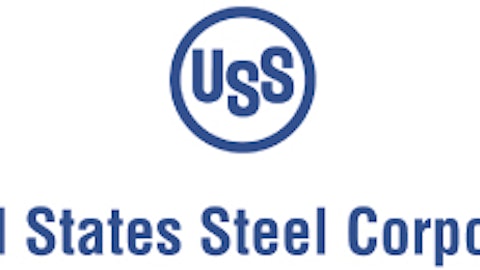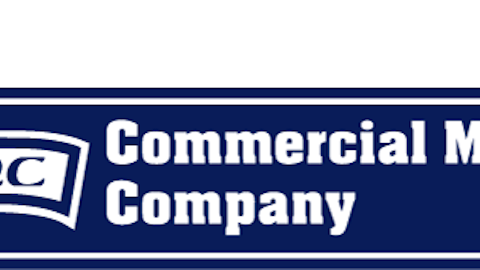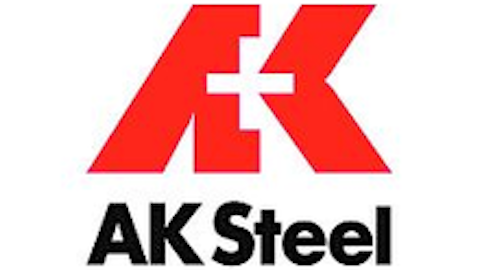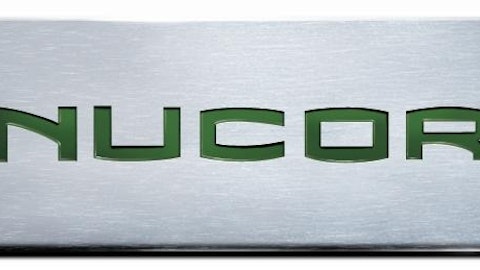On July 18, the United States Steel Corporation (NYSE:X)’ biggest mini-mill steel producer, Nucor Corporation (NYSE:NUE) , released its earnings for the second quarter, 2013. The company reported a 24% decline in its income amid low steel prices. With Nucor Corporation (NYSE:NUE)’s earnings falling prey to low prices, two key questions come to mind: What’s in store for steel prices going forward? And is Nucor a good investment right now?

Nucor’s earnings
During the second quarter, Nucor Corporation (NYSE:NUE) posted earnings of $85.1 million, or 27 cents a share, versus $112.3 million, or 35 cents a share, last year. Nucor Corporation (NYSE:NUE) missed its consensus earnings estimates by 3 cents but beat its revenue expectations by a slight margin. However, compared to the last year, company’s revenue slipped 9% to $4.67 billion.
According to the company, the primary reason behind low revenue was a decline of 7% in average sales price, compared to last year. Total tons shipped to outside customers stood at 5,839,000 tons, down 1% from the same quarter last year. Total steel mill shipments declined by 3%, while the downstream products’ shipments to outside customers decreased by 4%.
Going forward
Analysts expects a modest improvement in Nucor’s earnings during the next quarter. In Q3 2013, analysts expect Nucor Corporation (NYSE:NUE) to earn 48 cents per share on total revenue of $4.76 billion. For the year, analysts’ estimates stand at $1.60 per share on $18.82 billion revenue.
Steel prices
The main reason behind these low steel prices has been “cheap imports” from the Chinese market. Nucor’s CEO, John Ferriola said that rising exports from China could damage the U.S. economy. He criticized government policies, due to which, Chinese exporters are selling steel at subsidized rates. According to him, “The current trade laws simply are not getting the job done”.
Recently, a group of U.S. companies producing OCTG (steel pipe used to drill oil & gas), launched a case against steelmakers from nine countries. According to these companies; steelmakers in India, Thailand, Turkey, Philippines, Saudi Arabia, South Korea, Taiwan, Ukraine and Vietnam are taking advantage of unfair subsidies, allowing them to sell steel at a very low rate in the U.S. Due to this unfair steel trading, the local steel producers have been forced to operate on meager margins.
Having said this, steel prices have somewhat recovered since the first few weeks of July. This small price hike isn’t due to an improved market, but to a series of unforeseen events. A work lockout in Ontario, plus blast furnace outages in Ohio and Brazil have shrunk the annual U.S. capacity by 4%. As a result, there’s no oversupply in the U.S. market, at least for now.
During the first half of July, the price of benchmark hot-rolled steel coil was hovering around $630 per ton, an increase of 10% from its 2013 low of $570.
Steel industry’s major players
The fifth largest producer of carbon steel in the U.S., Steel Dynamics, Inc.
(NASDAQ:STLD), released its second quarter earnings on July 17. The company also fell victim to low steel prices as it posted revenue of $1.9 billion, down 5% from the same quarter, last year. The company earned 13 cents a share, 7 cents less than the previous year. Average selling price for Steel Dynamics, Inc. (NASDAQ:STLD) fell by more than 8% per ton, compared to 2012’s second quarter.
Increase in Steel Dynamics, Inc. (NASDAQ:STLD)’ special-bar-quality products and fabrication shipments are a healthy sign for the company’s future. The company would be starting some of its major projects at the end of this year, including special-bar-quality capacity expansion and the addition of premium rail product. Steel Dynamics, Inc. (NASDAQ:STLD) is selling at a low forward P/E (1yr) of 10.09, making it one of the cheapest buys in the steel industry. A mean recommendation of 2.3 on the sell side shows that it’s one of the better buys in the industry.
On the other hand, integrated steel producer United States Steel Corporation (NYSE:X) will be reporting its second quarter results on July 30. Analysts expect the company to post a loss of 78 cents per share on $4.61 billion revenue. United States Steel Corporation (NYSE:X)’s share price has declined by more than 23% this year. It’s one of the most cyclical companies in the steel industry; a super high beta of 2.36 is a testimony to this. In other words, it depends mainly on steel prices. Moreover, a high debt to equity ratio of 113 makes it a highly leveraged company. Therefore, it’s a highly risky investment.
United States Steel Corporation (NYSE:X)’s dividend has gone down by 25% during the last five years. A negative PEG ratio of -1.13, plus, a mean recommendation of 2.9 on the sell side doesn’t make it an attractive buy at this stage.
Conclusion
Thanks to a temporary price hike in the U.S., Nucor Corporation (NYSE:NUE) will post slightly better results in the third quarter. But its future prospects depend largely on U.S. steel imports, and Europe’s economic recovery. According to the American Iron and Steel Institute, steel imports are expected to increase for the fourth straight year in 2013. With more subsidized steel in the market, margins for domestic steelmakers are bound to remain low. The complaint made by U.S. companies regarding OCTG may have an effect on U.S. steel imports, but its decision isn’t due for six months. In short, if the U.S. government doesn’t impose any duties on the importers, steel prices will remain low. Further, if Europe’s economic conditions don’t improve, steel’s global demand will take a further hit. Therefore, I remain neutral on Nucor.
Waqar Saif has no position in any stocks mentioned. The Motley Fool recommends Nucor. Waqar is a member of The Motley Fool Blog Network — entries represent the personal opinion of the blogger and are not formally edited.
The article Nucor & Steel Prices originally appeared on Fool.com is written by Waqar Saif.
Copyright © 1995 – 2013 The Motley Fool, LLC. All rights reserved. The Motley Fool has a disclosure policy.





